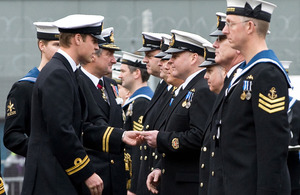Prince William honours UK submariners
Prince William paid a special visit to HM Naval Base Clyde yesterday to personally present awards to the sailors who maintain the UK's nuclear deterrent.

His Royal Highness Prince William presents gold pins to sailors who have served on nuclear deterrent patrols [Picture: POA(Phot) Ian Arthur, Crown Copyright/MOD 2010]
The base, which was recently named as the future home of all of Britain’s submarine services, is the home of HMS Astute, as well as the Navy’s four Vanguard class submarines, which carry the Trident nuclear deterrent.
More than 500 sailors attended the ceremony at the base in Faslane where those who have sailed on deterrent patrol for more than 30 days were awarded a silver pin by Prince William.
The Prince, who is Commodore in Chief Submarines, also presented gold pins to sailors who have served on 20 or more patrols.
Twenty patrols, including training and exercising, could add up to as much as eight years under the sea - a sign of unparalled professionalism, dedication and commitment.
Chief Petty Officer Stephen Irvine was presented with a gold pin by the Prince, in recognition of his 28 patrols of duty.
He said:
Prince William asked me how long I’d been at sea and whether I’d enjoyed it. I was fairly honest with him and told him there are ups and downs, but on the whole I’ve enjoyed it.
When he was presenting us with our badge, I felt really privileged to be the one of the first to get the award, and from our future king.
The four Vanguard class submarines, Vanguard, Victorious, Vigilant and Vengeance, have never missed a second of continuous at sea deterrence with their Trident missile systems since taking over from the Resolution class Polaris.
The crews, of up to 130 men, work six hours on and six hours off, with every single member having a responsibility that is crucial to a patrol that could last for more than three months.
At 16,000 tonnes, the submarines are close to the size of an aircraft carrier and yet they run at near silent noise signature, deep in the ocean, no one knows where, not even their own Royal Navy or other allied units.
Rear Admiral Mark Anderson, the Royal Navy’s Rear Admiral Submarines said:
While the individual details of these prolonged and demanding missions must remain classified, each patrol confirms the abilities and resilience of a deterrent force vital to the defence of this nation and our close allies.
Such patrols are conducted in complete isolation and usually at long distances from home, without the benefit of any form of external support.
The crews are not permitted to tell their families where they are going or where they have been, and deployment and return dates cannot be disclosed. Radio silence means that for the duration of the patrol there is no outgoing communication with the outside world, including families.
This discipline means that in addition to separation from their families, those on a deterrent patrol also have to tolerate extreme isolation from their loved ones.
This award provides recognition of their great endeavours, professional skill, personal sacrifice and exceptional service in the maintenance of a Continuous At Sea Deterrent.
He added:
This award is also testimony to the commitment of the families the submariners leave behind - they also give great service to this nation’s Defence of the Realm.
The nuclear powered Vanguard class Trident Ballistic Missile Submarines are tasked with maintaining the United Kingdom’s independent strategic nuclear deterrent.